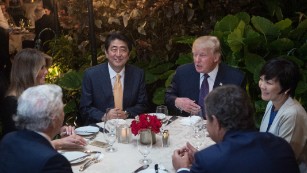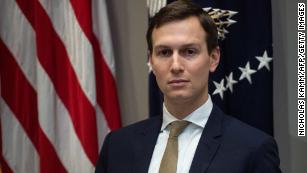Why Omarosa's secret recording is an alarm bell
CNN analyst Juliette Kayyem is the author of "Security Mom: My Life Protecting the Home and Homeland." She is a professor at Harvard's Kennedy School, a former assistant secretary of the Department of Homeland Security in the Obama administration and CEO of Zemcar. The opinions expressed in this commentary are those of the author. View more opinion articles on CNN.
(CNN)Omarosa had outdone herself, and that's hard to do when you are, well, Omarosa. But what she says she did is no laughing matter.
On Sunday morning, Omarosa Manigault Newman -- a former senior aide to President Donald Trump -- claims she had recorded a conversation in the White House Situation Room. In an interview on NBC's "Meet the Press," Manigault Newman, author of a tell-all book about the Trump White House, played a recording of chief of staff John Kelly firing her last January.
The fact that the recording exists is shocking; that it allegedly happened in the most secure room in the White House -- known as a SCIF (Sensitive Compartmented Information Facility) -- would represent a violation of strict internal procedures prohibiting unsecure devices there. The goal of these rules, of course, is to ensure that no external devices can be used by foreign enemies or spy services to listen in or record sensitive information.
The goal is to keep America safe.
If it happened the way Manigault Newman says it did, then it would appear that, in this White House, the enemy is within. And while, as a former government official in homeland security, I am unforgiving of Omarosa's deliberate action, no one should be surprised about it. After all, the reality show star -- hired by Trump and given entrée to the upper reaches of US government -- appears to have "qualified" for her job mainly because of her (until now) loyalty to him.
From the beginning, President Trump has flouted safety and security protocols. And in his neglect in enforcing security culture, he has set the tone for the White House. What would deter the "troops" from simply following his lead?
President Trump has often remarked that he wants the White House to run more like a business; his son-in-law and senior adviser Jared Kushner told the Washington Post last year that "the government should be run like a great American company." Unfortunately, in terms of security culture, the White House looks more like British Petroleum botching the Gulf oil spill, or Sony fumbling its cyberhacking crisis.
"Security culture" is a term often used in corporate settings. When a company is doing it right, it is "both a mindset and mode of operation. One that's integrated into day-to-day thinking and decision-making can make for a near-impenetrable operation," wrote Kevin Beaver, a corporate security specialist. "Conversely," he added, "a security culture that's absent will facilitate uncertainty and, ultimately, lead to security incidents that you likely can't afford to take on."
Safety and security don't happen by themselves. They require people to abide by the rules; they are only as strong as the weakest link. A door badge system, for example, won't work if badge holders keep the door open for those without badges. And throughout institutions and corporations, it is leadership that is essential in setting the tone for rigorous safety enforcement.
A CEO who enforces cyber rules or active-shooter training -- that is, a CEO who is engaged in safety design and execution -- will find that employees will follow suit. The BP oil spill did not happen in a vacuum; it was the consequence of a leadership culture that consistently denigrated safety concerns, leaving employees fearful, even, of reporting safety lapses.
President Trump has consistently flouted the safety and security apparatus designed to protect America's secrets. For example, for many months in the Trump administration, security clearances were granted on an interim basis because too many White House staff could not get through FBI review; this included, for some time, Jared Kushner.
Why does this matter? "If the level of your interim clearance is Top Secret/Sensitive Compartmented Information (SCI), the highest level, then you get to see the highest level information," notes former White House "ethics czar" Norman Eisen. "The risk ... is that somebody will accumulate a large amount of exposure to the highest level of classified information and then their clearance will be reduced or removed. You can't make people forget what they've already learned."
It's unusual for interim clearances to drag on for months, and potentially dangerous.
Trump uses a nonsecure phone for communications, claiming it is too "inconvenient" to adhere to rules. He gets important briefings outside of secure facilities. At best, he doesn't take security seriously; at worst, he doesn't appear to care.
It does not help that he has spent close to two years undermining the very security specialists -- the CIA and the FBI -- who design these protocols. If everything is a "deep state" ploy -- as the President has suggested -- then the dangers presented by our real enemies, those nations that would like our secrets, are likely to be minimized.
In this security culture vacuum, it would not be surprising if former "Apprentice" contestant Omarosa Manigault Newman felt enabled and energized to record in the Situation Room -- an action that would be treated as a shocking breach in any other administration. In this one, it's look out for yourself and don't worry about the iPhone.
end quote from:
https://www.cnn.com/2018/08/12/opinions/omarosa-recording-in-situation-room-kayyem/index.html

















No comments:
Post a Comment